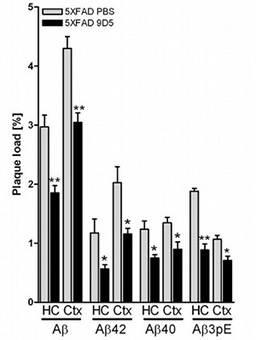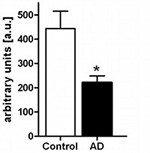Therapy of Alzheimer's Disease with an antibody against oligomeric pyro-Glu-Abeta peptides
Scientists at the University of Göttingen developed a novel, proprietary antibody for the therapy and/or diagnosis of Alzheimer's Disease (AD) through the targeting of specifically pyro-Glu-Amyloid beta peptides.
Challenge
Alzheimer's Disease (AD) is the main neurodegenerative disease worldwide affecting more than 29 Mill. people. By 2050 the prevalence will quadruple, by this time 1 in 85 persons worldwide will be living with AD. AD still features high growth potential and room for further innovation due to the huge worldwide growth of the number of patients and the lack of efficacious drugs. The AD market is estimated at 1,6 Mrd US$ for 2015, the main countries affected being USA, Japan and Germany.
Our Solution
We developed a new proprietary, monoclonal antibody against Alzheimer's Disease.
This antibody selectively targets specifically oligomeric pyro-Glu-Abeta 3-42 peptides. Intraneuronal pyro-Glu-Abeta 3-42 peptide is toxic and triggers neurodegeneration and lethal neurological deficits. In its oligomeric form pyro-Glu-Abeta peptides are the triggers of Abeta aggregation and plaque formation, thus play a key role in the development and progression of AD.
Advantages
(1) Therapeutic effect: Rescue of behavioral deficits Behavioral tests with AD mice after passive immunization with our proprietary 9D5 antibody for six weeks (age at analysis six months) show that treatment with our antibody improves behavioral deficits or halts their progression (Black = 9D5 injection, gray = PBS injection) (Source: T. Bayer).
Behavioral tests with AD mice after passive immunization with our proprietary 9D5 antibody for six weeks (age at analysis six months) show that treatment with our antibody improves behavioral deficits or halts their progression (Black = 9D5 injection, gray = PBS injection) (Source: T. Bayer).
(2) Reduction of plaque load
 Passive immunization of AD mice with our proprietary 9D5 antibody for six weeks results in a reduced plaque load not only of pyro-Glu Abeta but also of other Abeta variants (Abeta-40, Abeta-42) in both cortex and hippocampus (*p < 0.05; **p < 0.01). This underlines the role of pyro-glu Abeta oligomers as a catalyst of plaque formation (Source: T. Bayer).
Passive immunization of AD mice with our proprietary 9D5 antibody for six weeks results in a reduced plaque load not only of pyro-Glu Abeta but also of other Abeta variants (Abeta-40, Abeta-42) in both cortex and hippocampus (*p < 0.05; **p < 0.01). This underlines the role of pyro-glu Abeta oligomers as a catalyst of plaque formation (Source: T. Bayer).
(3) Diagnosis
 Sandwich ELISA with proprietary 9D5 antibody as capturing antibody and 2-48 (anti pyro-Glu-Abeta) as detecting antibody demonstrates reduced levels of plasma levels of pyro-Glu-Abeta peptide oligomers in AD patients (n=16) as compared to non-demented controls (n=10) (unpaired t-test, p<0.05) (Source: T. Bayer).
Sandwich ELISA with proprietary 9D5 antibody as capturing antibody and 2-48 (anti pyro-Glu-Abeta) as detecting antibody demonstrates reduced levels of plasma levels of pyro-Glu-Abeta peptide oligomers in AD patients (n=16) as compared to non-demented controls (n=10) (unpaired t-test, p<0.05) (Source: T. Bayer).
Applications
- Therapy of AD
- Therapy of familial AD as an orphan drug
- Companion diagnostic, diagnostic for patient recruiting and therapy efficacy test
- Diagnosis of AD as a blood ELISA test
Developmental Status
Proof of concept (rescue of behavioral deficits) in a mouse animal model.
Patent Status
Granted US patent (US8795664B2).
Patent holder are the Georg-August-University University-Medical-Center Göttingen
and Synaptic Systems Gesellschaft für neurobiologische Forschung, Entwicklung und Produktion mbH.
References
J. Biol. Chem. 2010, 285, 41517-41524, Wirths et al. (J. Biol. Chem. jbc.M110.178707)
J. Alzheimer's Disease 2012, 30, 1-11, Venkataramani et al.
J. Biol. Chem. 2011, 286, 38825-38832, Jawhar et al. (J. Biol. Chem. jbc.R111.288308)
J. Biol. Chem. 2012, 287, 8154-8162, Wittnam et al.
Neurobiology of Aging 2012, 33, 6.e29-196.e40, Jawhar et al.
J. Neural Transm. 2010, 117, 85-96, Wirths et al.
Acta Neuropathol. 2010, 120, 369-384, Boche et al.
Nature 2012, doi:10.1038/nature11283, Jonsson et al.
Nature 2012, doi: 10.1038/nature11060, Nussbaum et al.
Neurodegenerative Dis 2012, 10, 265-270, Frost et al.
Contact
Dr. Stefan Uhle
Patent Manager Life Sciences
E-Mail: This email address is being protected from spambots. You need JavaScript enabled to view it.
Tel.: +49-551-30724154
Reference: BioT-1369-UMG
Tags: Therapy, Life science
